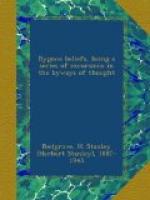[1] The story, of course, is entirely fictitious. For further particulars see Sir J. E. SANDYS’ essay on “Roger Bacon in English Literature,” in Roger Bacon Essays (1914), referred to below.
Ilchester, in Somerset, claims the honour of being the place of ROGER BACON’S birth, which interesting and important event occurred, probably, in 1214. Young BACON studied theology, philosophy, and what then passed under the name of “science,” first at Oxford, then the centre of liberal thought, and afterwards at Paris, in the rigid orthodoxy of whose professors he found more to criticise than to admire. Whilst at Oxford he joined the Franciscan Order, and at Paris he is said, though this is probably an error, to have graduated as Doctor of Theology. During 1250-1256 we find him back in England, no doubt engaged in study and teaching. About the latter year, however, he is said to have been banished—on a charge of holding heterodox views and indulging in magical practices—to Paris, where he was kept in close confinement and forbidden to write. Mr LITTLE,[1] however, believes this to be an error, based on a misreading of a passage in one of BACON’S works, and that ROGER was not imprisoned, but stricken with sickness. At any rate it is not improbable that some restrictions as to his writing were placed on him by his superiors of the Franciscan Order. In 1266 BACON received a letter from Pope CLEMENT asking him to send His Holiness his works in writing without delay. This letter came as a most pleasant surprise to BACON; but he had nothing of importance written, and in great haste and excitement, therefore, he composed three works explicating his philosophy, the Opus Majus, the Opus Minus, and the Opus Tertium, which were completed and dispatched to the Pope by the end of the following year. This, as Mr ROWBOTTOM remarks, is “surely one of the literary feats of history, perhaps only surpassed by Swedenborg when he wrote six theological and philosophical treatises in one year."[1b]
[1] See his contribution, “On Roger Bacon’s Life and Works,” to Roger Bacon Essays.
[1b] B. R. ROWBOTTOM: “Roger Bacon,” The Journal of the Alchemical Society, vol. ii. (1914), p. 77.




